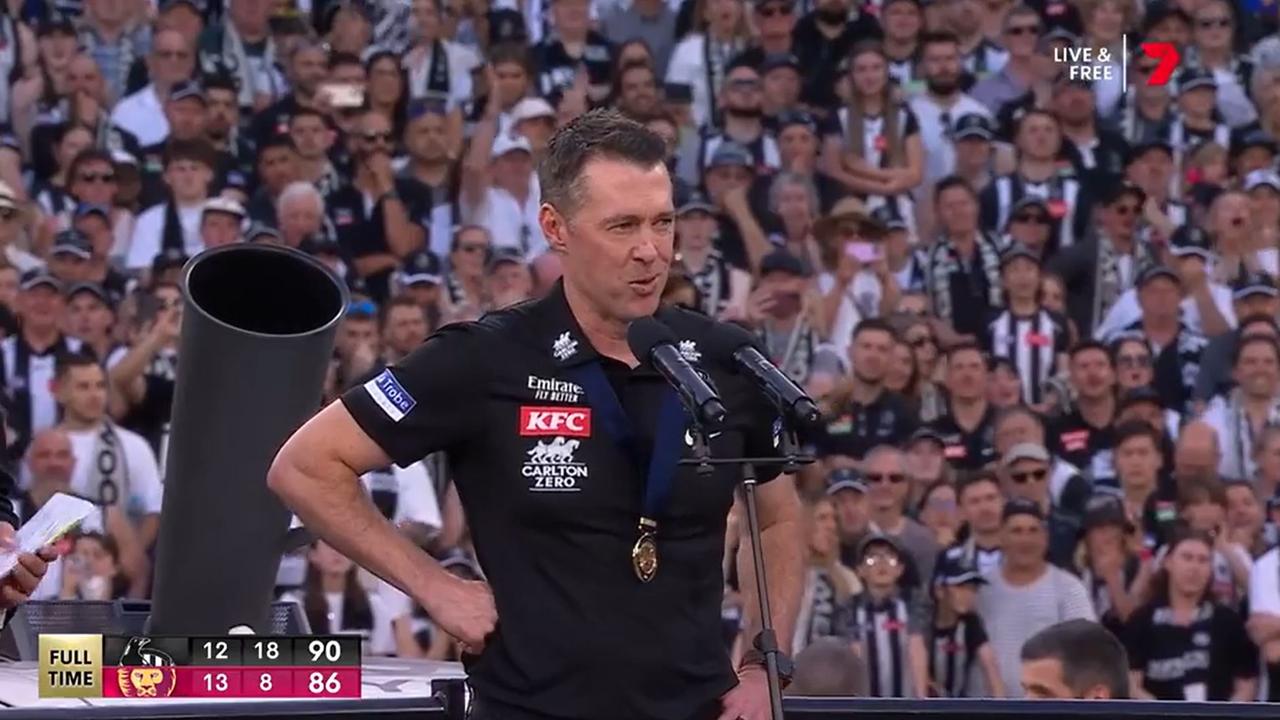
Craig McRae, a name synonymous with success and excellence in Australian Rules Football, shocked the footy world when he announced his retirement after his team’s grand final victory. McRae’s unexpected decision came at a pivotal moment, leaving fans, players, and the entire AFL community in a state of disbelief. Known for his resilience, tactical mind, and leadership, McRae’s departure marked the end of a remarkable era for both the individual and the club he served so loyally.
This article will explore McRae’s career, his influence on the sport, the reasons behind his retirement, and the implications of his departure for the future of the club and the AFL. From his rise in the AFL to his ultimate decision to retire, McRae’s journey provides valuable insights into the sacrifices and triumphs that define professional athletes, and his sudden exit raises important questions about the pressures of elite-level sport.
Early Life and AFL Beginnings
Craig McRae, often known affectionately as “Fly,” was born in Victoria, Australia. Growing up in a family with a strong sporting culture, McRae’s natural athleticism was evident from a young age. Football quickly became his passion, and as he honed his skills, it became clear that he had the potential to reach the highest levels of the game. McRae’s early years were spent in the junior leagues, where he established a reputation for being a versatile and determined player, willing to sacrifice personal accolades for the team’s success.
McRae’s AFL career began in 1997 when he was drafted by the Brisbane Lions. His arrival at the club marked the beginning of what would be a transformative period not only for McRae but also for the Lions as a whole. Brisbane, under coach Leigh Matthews, was a team on the rise, and McRae would play an essential role in its evolution into a powerhouse of the AFL.
While McRae wasn’t the flashiest player on the field, he quickly became a key component of the Lions’ success due to his work ethic, leadership, and ability to contribute in both attacking and defensive roles. He was often seen as the unsung hero – the player who did all the hard work that allowed the superstars of the team to shine. His ability to play a team-first game without seeking individual glory made him a fan favorite.
The Lions’ Dynasty and McRae’s Impact
Craig McRae’s time at the Brisbane Lions coincided with one of the most successful periods in the club’s history. McRae was an integral part of the Lions’ three consecutive AFL premiership victories in 2001, 2002, and 2003, which cemented the club as a dominant force in the AFL. Throughout these years, McRae’s consistency, leadership, and commitment were pivotal in Brisbane’s success.
In particular, McRae’s selflessness on the field made him a model for the team. Known for his tough tackling, smarts around the ball, and ability to get the ball forward, McRae played a significant role in ensuring the team’s defensive stability while also contributing to their offensive efforts. His presence was felt in crucial moments, and it became apparent that McRae’s influence extended far beyond just his on-field statistics. He was a leader in the locker room and on the field, a player who was always willing to sacrifice his body for the team.
Despite not being the club’s most recognized name during this period – with the likes of Michael Voss, Jonathan Brown, and Simon Black taking the spotlight – McRae’s role was invaluable. He was a perfect example of a player who understood the importance of the collective over individual glory. This understanding of the team dynamic and his dedication to the club helped him to thrive within a system that demanded high levels of discipline and sacrifice.
Transition to Coaching
After retiring as a player, McRae transitioned seamlessly into a coaching role, taking on a new challenge in the AFL. His coaching career began in the lower leagues and assistant coaching roles, where his reputation as a strategic and thoughtful leader began to grow. McRae’s playing career had given him a unique perspective on the game, and this made him a highly sought-after mentor for emerging talent.
In 2017, McRae joined the Richmond Tigers as an assistant coach, where he would continue to develop his coaching philosophy. At Richmond, McRae worked under Damien Hardwick, helping to transform the club into one of the most successful and dynamic teams in the competition. His work with Richmond’s forward line and his tactical influence in training and game strategy were seen as critical to the Tigers’ eventual dominance of the AFL, culminating in premierships in 2017, 2019, and 2020.
McRae’s coaching style was noted for its emphasis on team unity, intensity, and an unwavering commitment to the process. He was a coach who valued the same work ethic and humility that he had embraced as a player. McRae also had a knack for nurturing young players, helping them reach their full potential both on and off the field. His ability to connect with players, communicate effectively, and foster a strong team culture made him a respected figure in the AFL coaching community.
The Unlikely Coaching Success with Collingwood
In 2021, McRae’s coaching journey reached a new height when he was appointed as head coach of the Collingwood Magpies. This was a significant moment in his career, as he took on the role of head coach for one of the most storied clubs in AFL history. The pressure was immense, and the expectations were high, but McRae’s calm demeanor and experience stood him in good stead.
McRae’s appointment came at a time when Collingwood was in a period of transition, and the team was undergoing a rebuilding phase. The previous coaching tenure had left behind a team that was in need of both strategic direction and leadership. McRae’s task was clear: to restore the Magpies to a position of competitive relevance and, eventually, to challenge for the ultimate prize – the AFL premiership.
Under McRae’s guidance, Collingwood experienced an immediate resurgence. His emphasis on team defense, structure, and the development of younger players paid dividends. The team’s performance in the 2022 AFL season was nothing short of impressive, with the Magpies reaching the grand final in McRae’s second season as head coach. His influence on the team’s style of play, combined with his ability to foster unity within the squad, turned Collingwood into one of the most feared teams in the competition.
As the grand final approached, fans, pundits, and players alike were focused on how McRae’s tactical approach would help shape the outcome. The anticipation of this game was palpable, with McRae’s leadership being a major talking point throughout the season.
The Shocking Retirement Announcement
After Collingwood’s triumphant grand final victory, Craig McRae’s unexpected retirement announcement left the AFL world in stunned silence. Just when it seemed that McRae was poised to lead Collingwood into a new era of dominance, he chose to step away from the game at its peak. The decision was both surprising and heart-wrenching for fans, players, and fellow coaches, who had come to see McRae as one of the brightest minds in the AFL coaching ranks.
The reasoning behind McRae’s retirement was layered and multifaceted. One of the key factors in his decision was a desire to spend more time with his family. Throughout his career, McRae had been deeply committed to his work, often prioritizing the demands of the game over personal time. With the grand final victory providing a natural conclusion to his coaching journey at Collingwood, McRae felt it was the right moment to step away from the spotlight and focus on his family and personal life.
Additionally, McRae had always been someone who valued balance and perspective. After many years of relentless dedication to the game, he recognized the toll that being at the top level of coaching had taken on his physical and emotional well-being. Stepping away after a grand final victory allowed him to exit the game on his own terms, ensuring that his legacy remained untarnished.
Legacy and Impact on Collingwood and the AFL
McRae’s sudden retirement undoubtedly leaves a hole in the AFL, but his legacy is secure. His influence on Collingwood was profound, and his coaching philosophy will continue to resonate with the team for years to come. The impact of his leadership can be seen in the way Collingwood turned its fortunes around under his watch. From a team in transition to AFL champions, McRae’s strategic approach to coaching was pivotal in the Magpies’ success.
McRae’s retirement also marks the end of an era for the AFL, as it loses one of its most respected and successful coaches. His decision to retire after a grand final victory has also set a new precedent for how athletes and coaches approach the end of their careers. In an era where many continue to push for more championships or personal accolades, McRae’s choice to retire at the height of his career demonstrates the importance of knowing when to step away and prioritize what truly matters.
For the AFL, McRae’s departure signals the end of a period dominated by his tactical mind and leadership. His legacy will inspire future generations of coaches who will look up to his example of dedication, humility, and commitment to team success. While Collingwood and the AFL world will miss his presence, McRae’s impact on the game will remain long after his retirement. His influence will continue to shape the coaching landscape for years to come.






